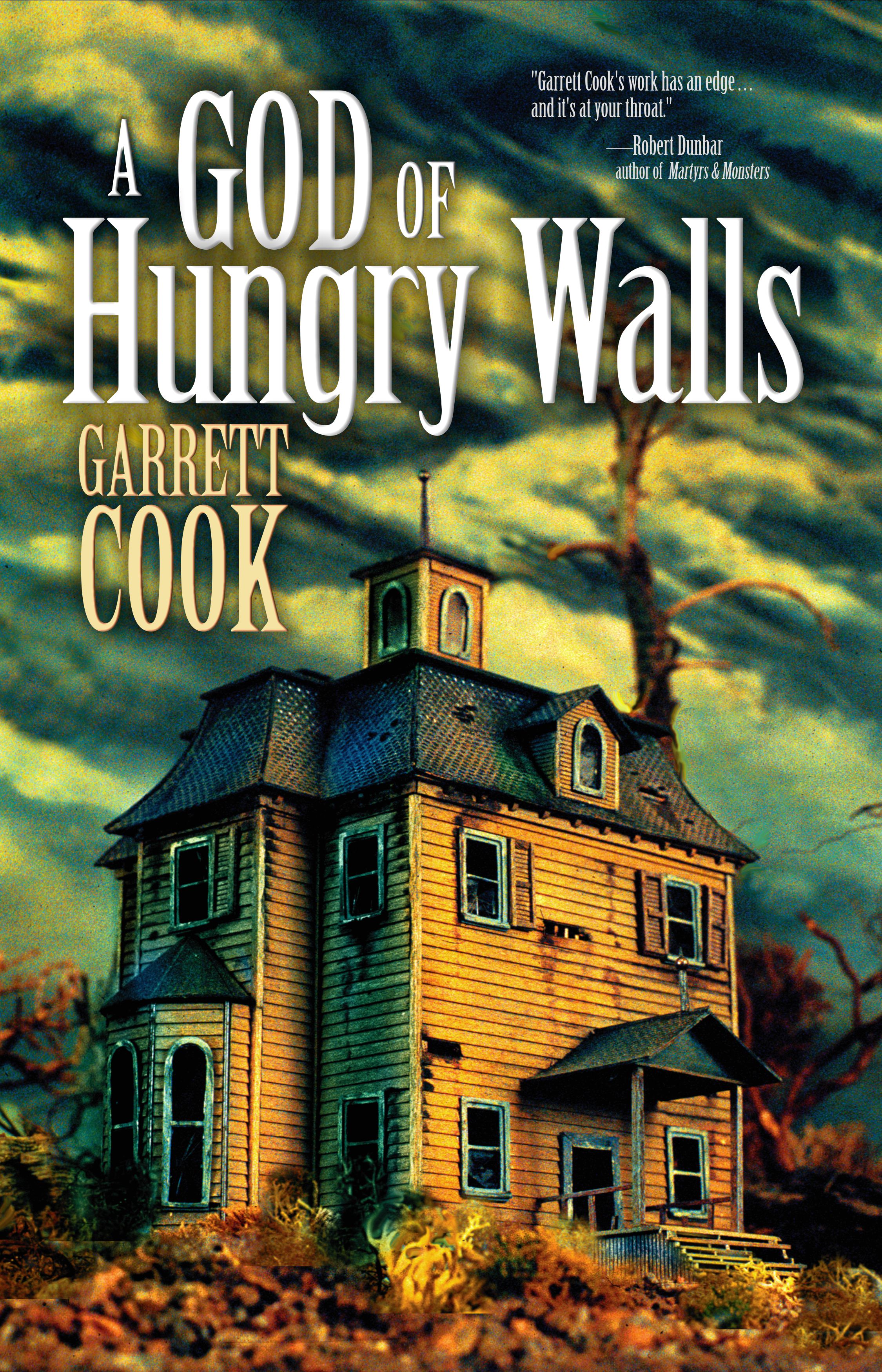
A God of Hungry Walls by Garrett Cook
(Disclosure: I’ve taken writing workshops from Garrett Cook, and he’s done editing work for me.)
There’s horror fiction out there that seeks to entertain, like the thrillers by the late Richard Laymon. Then there’s horror that seeks to get under skin and disturb you on a deep psychological level, like Jack Ketchum’s incredibly difficult masterpiece The Girl Next Door. Garrett Cook’s latest novel, A God of Hungry Walls, is the latter.
The story is about a haunted house, with the twist that the story is told from the perspective of the haunting. Believing itself to be a god within the house it resides in, the entity is determined to make the new roommate moving in his possession, like all the other residents almost already are. Like anyone who’s entered his walls have become. However, this new resident has brought something with him. Something that lives in the closet and begins to challenge his power over the house.
Do you know that you are praying? You’ve never prayed before. Do you know that you are on your knees before the sacred icon that is me? Do you know that you are praying? Because you are. In these walls, I am god. And I am worse than god.
Everything about this book is confrontational. The urgent and aggressive prose, the nonlinear structure, the graphic imagery and the uncomfortable insights into the neuroses of the residents of the house.
The angry “god” who we follow constantly moves between the present, the past, the dead and the living in multiple ways. The spirits of the people who have died within the house are constantly forced to relive the most painful moments of their lives. That is, when they’re not being subjected to hellish tortures or being offered the most bitter, awful moments of hope. Both for the entertainment of the “wallsgod” and to keep them under his control.
This is history and history is a force of nature, bloodthirsty and implacable. History rapes and runs roughshod over all.
For the living residents, he’ll sometimes torture them in generic ways, like flashing horrible hallucinations before their eyes. But his preferred method is to get inside their minds, find their psychological weakness and gradually poke harder and harder at it, until they destroy themselves. Until they give themselves up to the wallsgod.
Take, for example, the character of Leah, a medical student plagued with self-doubt and an eating disorder.
She’s studying and listening to music, trying not to get carried away and therefore not carted away again. She wouldn’t want to end up back in the hospital. She says she likes her body. She says she’s doing well enough. She says that a bowl of frozen yogurt or an episode of Project Runway isn’t going to hurt her. She subvocalizes this too many times for her to count. As if she could eventually believe it. It will hurt you. Make you fat. Make you fail. She makes a well of self assurance as she takes in the names of veins or nerves of bones of arteries, of all the things that can break them down, the myriad maladies she will have to know by heart. The facts slip in but she loses them if I tweak just a little.
Leah already has plenty of rope to hang herself with. The wallsgod just needs to keep pushing and pushing. He eventually drives Leah towards one of the most disturbing deaths I’ve read in a book in a while.
One of the problems with some horror fiction with extreme content is that it doesn’t ring true. The motivations of the characters make no sense or are nonexistent. The result is that you feel like the author is just unleashing their id on to the page without regard. That’s not a problem in A God of Hungry Walls. Despite the supernatural element, Cook is able to convincingly show how a normal person with normal problems or desires could gradually be pushed into extreme acts against themselves or others.
I haven’t a throat for teeth but I feel its teeth on my throat and it hasn’t a throat for teeth and I haven’t teeth but it, it still feels mine. The whatever we are pushes against each other, united in violence like the lovers we puppeteer.
This is a book I highly recommend with some reservations. A God of Hungry Walls is masterfully excruciating and one of the finest horror books I’ve read. However, it’s definitely not for the everyone. This trip into the mind of an angry ghost with a god complex is difficult in its content and its structure. Skip it if you’re not up for a challenge.
______
 Ben Arzate lives in Des Moines, Iowa. His fiction and poetry has appeared in Ugly Babies, Bizarro Central, Spoilage, The Mustache Factor, Twenty Something Press, and Keep This Bag Away From Children. He blogs at http://dripdropdripdropdripdrop.blogspot.com/
Ben Arzate lives in Des Moines, Iowa. His fiction and poetry has appeared in Ugly Babies, Bizarro Central, Spoilage, The Mustache Factor, Twenty Something Press, and Keep This Bag Away From Children. He blogs at http://dripdropdripdropdripdrop.blogspot.com/
Subscribe to Adventures in SciFi Publishing podcast on: iTunes | Stitcher Radio (Android users) | RSS | Website RSS |

















Speak Your Mind